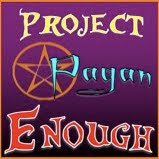The Flower Moon is a time for expanding and growing, metaphorically and in your garden. For those of you that planted at the last full moon, it's time to move those plants to larger pots. For those of you who have grown weary in your mundane lives, it's time to move yourself to another "pot." Perhaps you need to quit the job that you dread going to every morning or just build up the courage to put in for that promotion. If you've been out of work, maybe it's time to get back out there with your resumè.
If you're going to be performing a ritual tonight and you're lucky enough to have nice weather (unlike those of us in the Northeast - thundershowers - whoo!) you may want to draw on that spring energy. Light a few candles, grab those drums and head outside. Dance around under the light and power of the full moon. If you practice with your family, read or act out some spring themed myths from the pantheon you and/or your family feels closest with.
This myth is one of my favorites. It's not a spring myth, but a moon myth. Even though my mother's ancestors were Comanche Indians, I still love to read other American Indian myths. This one is from the Pueblo tribes:
Why the Moon Has One Eye
Long ago, Moon and Sun were made to always keep watch over all of the children of the earth. They kept their bright eyes on the earth all the time.
Sun looked down from the sky during the days. Under his bright light, the flowers and trees and other plants grew. The birds flew and sang, and the animals went about their way. The people also worked and played all throughout the day. And that was good.
Moon looked down from the sky during the nights. Her eyes were just as bright as those of her husband, the sun. So it was that there was never any darkness. Just as it was during the days, the flowers and trees and other plants grew. The birds flew and sang, and the animals went about their way. All throughout the night, the people worked and played. And for a while, that was also good.
But because there was no darkness, it was hard for all the children of the earth to rest. The flowers and trees and other plants grew without stopping, and they began to grow tired. The branches of the trees hung down in weariness, and the corn found it hard to stand tall. The flowers could barely lift their heads. Because they were always flying and singing, the birds grew hoarse and their songs were no longer so beautiful. The animals became so tired that it was hard for them to get food. The people were so worn out from alwas working and playing that they no longer laughed and smiled. They just walked about as if they were carrying great weights on their shoulders.
The moon and the sun saw that things upon the earth were no longer good for their children.
"We must do something so that our children can rest," the Moon said.
"I will give up one of my eyes," Sun said. "Then it will no longer be as bright during the daytime."
"No," Moon said. "It should be bright during the days. There must be light so that our children can go about their way. I am the one who must give up one of my eyes. Then there will be darkness in the nights and things will be good again."
So it was that Moon gave up one of her eyes. Now the night was no longer so bright as it had been. All of the children of the earth - the plants, the birds and animals, and the people - could rest during that time of darkness.
Even though her light was less than before, Moon's one eye was still quite bright. So it was that she decided to close her eye a little bit at a time throughout each month until it was all dark. Then she would begin to open her eye again.
Although Moon has only one eye, the Pueblo people say that she is even more beautiful than she was before. The sun is also beautiful, but his yes are so bright that no one can gaze directly at him without feeling pain. Moon's light, though, is so gentle that even when she is at her brightest, the people can gaze up at her to give thanks for the gift of darkness that she gave through her sacrifice.
- from The Girl Who Helped Thunder and Other Native American Folktales by James Bruchac and Joseph Bruchac, PhD.



1 comments:
Thanks so much Susie! Happy (post) Memorial Day to you!
Post a Comment